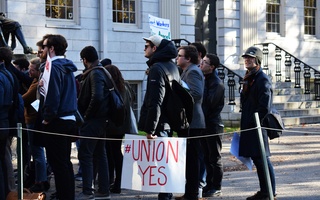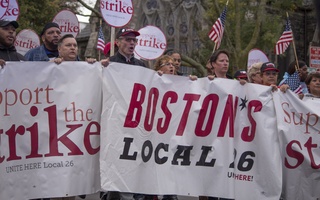{shortcode-72939bff2bdad82cada6360df6af6463a77e4c47}
Pointing to University President-elect Lawrence S. Bacow’s past comments on labor issues, Harvard graduate student union members and supporters say they worry he will not support unionization efforts after he takes the helm as Harvard’s 29th president.
Unionization advocates trace their concerns to comments Bacow, whose selection was announced Sunday afternoon, made while serving as president of Tufts University from 2001 to 2011. Bacow is slated to assume Harvard’s top post on July 1 after University President Drew G. Faust steps down.
During Bacow’s tenure, Tufts saw two major unionization efforts. Following a 2000 decision by the National Labor Relations Board to recognize graduate students as statutory employees, in 2002, graduate students at Tufts unsuccessfully attempted to unionize in conjunction with the United Automobile Workers.
“I believe it would be a mistake for graduate students to unionize,” Bacow wrote at the time. “The relationship between faculty member to graduate student is not one of employer to employee.”
Tufts’s graduate students eventually voted to unionize as a part of the Service Employees International Union in May 2017.
Sam S. Klug, an organizer for Harvard Graduate Students Union-United Automobile Workers, wrote in an email that he hopes Bacow has reconsidered his stance on labor since his tenure as president of Tufts.
“I hope that Bacow has reconsidered his views in the years since he was President of Tufts—especially now, when unions at Harvard are leading on protections for international and immigrant students, protections against campus sexual violence, and securing financial stability,” Klug wrote.
In 2009, staff members at Tufts attempted to join with the Harvard Union of Clerical and Technical Workers, Harvard’s largest employee union. Bacow wrote an open letter to his colleagues around the same time detailing his doubt that a union would result in material benefits for its members.
“To say that we could work with the union should not imply that I think unionization by the HUCTW is a good idea. Far from it,” Bacow wrote. “I believe that we are a stronger, more effective community when we all work together collaboratively and directly to address concerns in a cooperative manner. I don’t believe the formal process mandated by collective bargaining would help us address together the very real challenges Tufts faces in this economy.”
Bacow added Tufts would cooperate with the union if its organizing efforts proved successful.
“If the union succeeds in its organizing efforts, Tufts will do its part to foster a good working relationship with this union as well,” he wrote.
Undergraduates who support the Harvard unionization effort also said they find Bacow’s past statements on the topic problematic. Wilfried J.K. Zibell ’21, an HGSU-UAW undergraduate organizer, said he is “definitely concerned” about Bacow’s record.
“Based on what I’ve read about his positions on the Tufts unionization effort, he engaged in classic anti-union rhetoric, saying that he isn’t opposed to unionization, just this union, and saying that student workers don’t have an employee relationship with colleges,” Zibell said.
“But I remain cautiously optimistic that he may reverse his positions now that some time has passed,” Zibell added.
University representatives declined to comment.
—Staff writer Shera S. Avi-Yonah can be reached at shera.avi-yonah@thecrimson.com. Follow her on Twitter at @saviyonah.
—Staff writer Molly C. McCafferty can be reached at molly.mccafferty@thecrimson.com. Follow her Twitter at @mollmccaff.Read more in News
Seven Restaurants Confirmed for Smith Campus CenterRecommended Articles
-
Harvard: Drop the AppealUsing the University’s resources to deny graduate workers their democratic right to a free and fair election on unionization—whatever the results of that election—is a misuse of funds.
-
 At 'Drop the Appeal' Rally, HGSU-UAW Presents Petition to Mass. Hall
At 'Drop the Appeal' Rally, HGSU-UAW Presents Petition to Mass. Hall -
 Lawrence S. Bacow
Lawrence S. Bacow -
 College Democrats Endorse Graduate Student Unionization Efforts
College Democrats Endorse Graduate Student Unionization Efforts -
 Citing Harvard, Tufts Dining Workers Unionize
Citing Harvard, Tufts Dining Workers Unionize













